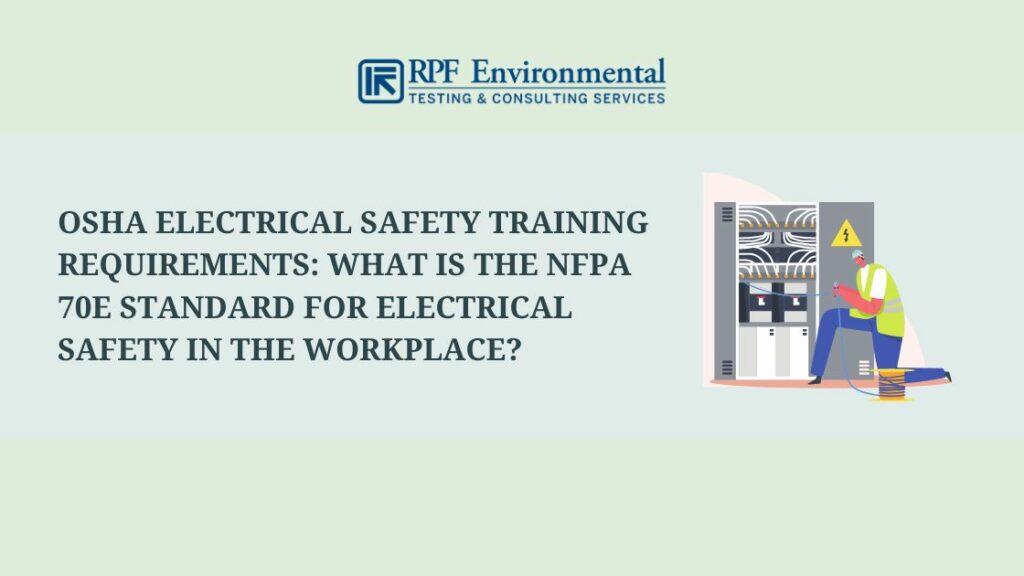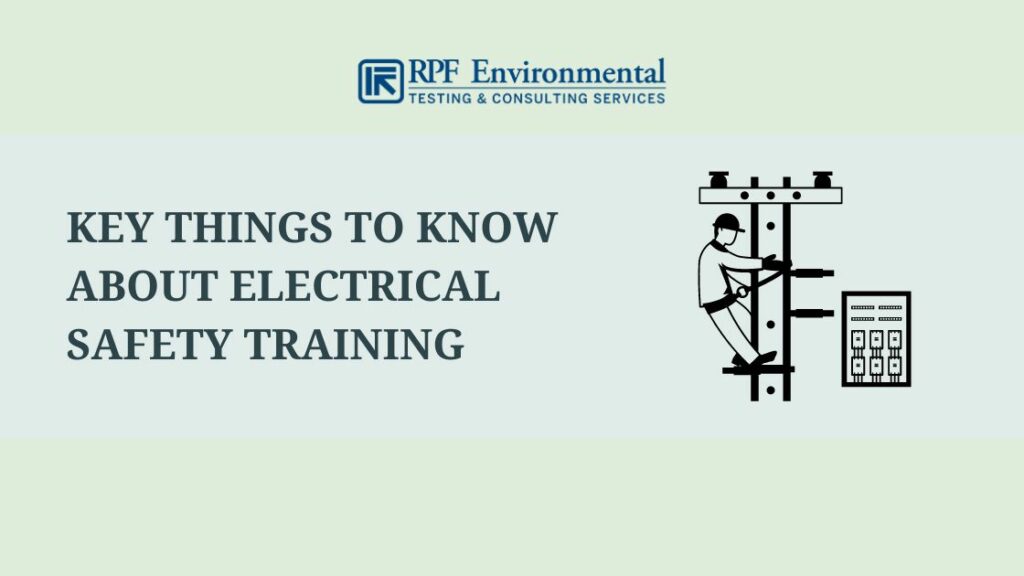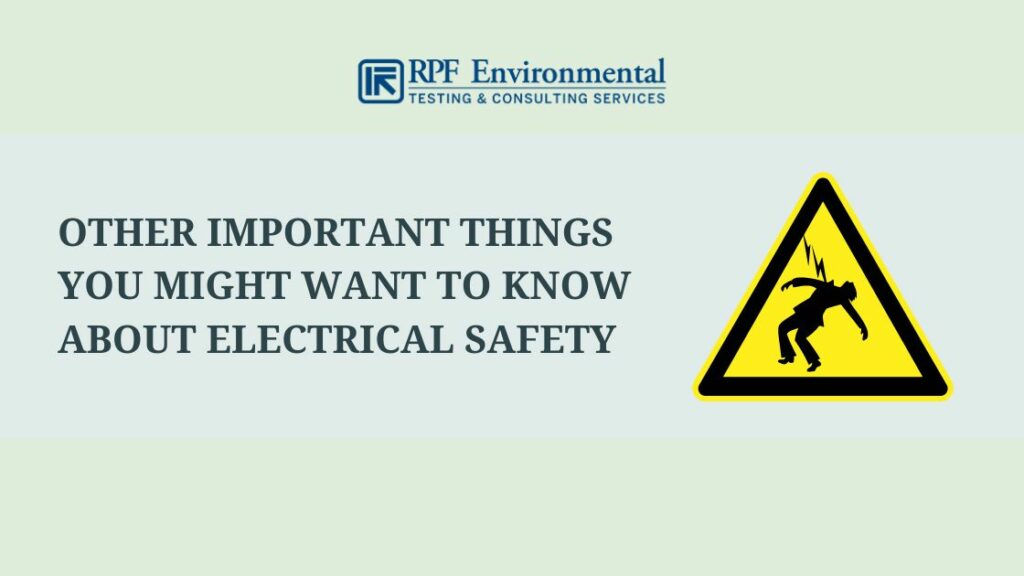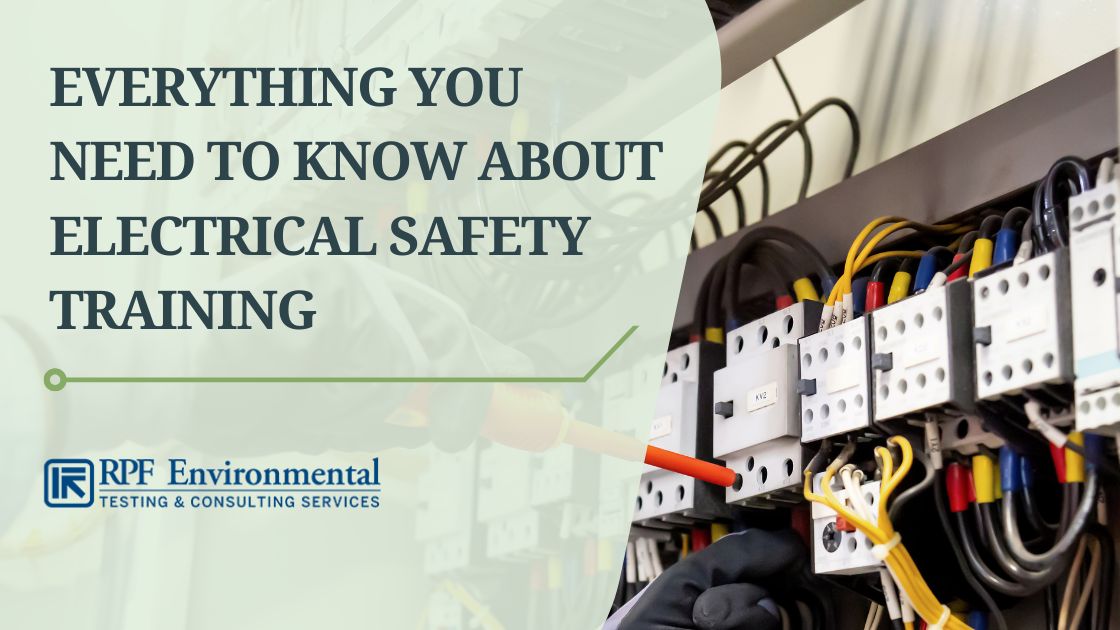Whether you are an employee or employer, it is crucial that you understand electrical safety including electrical hazard identification and proper control measures. Through electrical safety training, you will gain in-depth knowledge on safe work practices including OSHA and NFPA electrical safety standards and requirements. Thus, reducing costly fatalities, liabilities, and violations. Keep reading to know more about OSHA electrical training and compliance.

RPF Environmental can help with your OSHA electrical safety training in Indiana, Illinois, Maine, New Hampshire, Massachusetts, and beyond New England. We also offer other EH&S training programs including lockout/tagout training. Contact us for more details!
OSHA Electrical Safety Training Requirements: What is the NFPA 70E Standard for Electrical Safety in the Workplace?

The National Fire Protection Association (NFPA) 70E requirements were developed to help industries with their compliance with OSHA’s electrical safety training standards. Understanding the connection between these two standards as well as their importance in maintaining workplace safety is included in the training.
The main objective of the NFPA 70E standard is to create a workplace that is safe from electrical hazards by training individuals on how to manage electricity and control risks properly.
Key Things to Know About Electrical Safety Training

Training Duration & Completion
Electrical safety training programs usually take around four hours to complete. They are also often done through online classes which are more convenient because you can take the training at your own pace and convenience.
You will be given quizzes and a final exam at the end of the training which you need to pass (80% score or better) before you can receive a certificate. The number of attempts you have to pass the training will depend on your training provider.
Training Coverage
This will depend on the type of electrical safety training you will get. But, the standards covered include the following:
- OSHA 29 CFR 1910.331 to 335 (Electrical Safety-Related Work Practices)
- NFPA 70E (Standard for Electrical Safety in the Workplace)
Specific topics that may be included in the training include the following:
- Basics of electricity (e.g. how it works)
- Understanding NFPA 70E and OSHA electrical safety training standards and their importance
- Electrical safety training requirements
- Working on or near live parts
- Types of electrical hazards in the workplace (arc blasts, arc flashes, shocks, fires, electrocution, etc.)
- Recognizing and identifying electrical hazards as well as risk assessment
- Controlling and eliminating specific types of electrical hazards (hierarchy of risk controls)
- Emergency response procedures
- How to choose and use the right personal protective equipment
- Safety-related work practices and maintenance requirements including maintenance of special equipment
- Developing a comprehensive OSHA electrical safety program
NOTE: You should take an electrical safety training program that is tailored to your specific needs. The training should depend on the type of equipment you are using, job tasks, and employee risk.
Who Needs NFPA 70E Electrical Safety Training?
Qualified workers performing electrical work are required to take NFPA 70E training to ensure that they are doing their job safely. These include employees installing, testing, maintaining, or repairing electrical equipment.
In addition, unqualified individuals who might be exposed to electrical hazards including those working around electrical equipment should also receive training, especially on electrical hazards.
More specific workers that need NFPA 70E electrical safety training are:
- Electricians
- Mechanical engineers
- Wind and solar generator installers
- HVAC technicians
- Electrical & electronic engineers
- Electrical & electronic assemblers
- Stationary engineers
- Electrical contractors
- Electrical inspectors
- Riggers and roustabouts
- Industrial machine and equipment operators
- Welders
- Painters
- Mechanics
- Repairers
- Safety managers
- Risk managers
- Project managers
Other Important Things You Might Want to Know About Electrical Safety

What is the Importance of Electrical Safety Training?
The training aims to prevent fatalities and serious workplace injuries by helping employees understand the dangers of electrical work and teaching them how to work safely. In fact, 31% of fatalities from 2011 to 2021 are electrical-related according to ESFI’s workplace-related fatality statistics.
Moreover, the top occupations involved in electrical fatalities include:
- Electricians
- Laborers
- Electrical power installers and repairers
- Tree trimmers
- Electrician’s apprentices
What Are Electrical Hazards?
Some of the major electrical hazards in the workplace are:
- Electric shock
- Explosion
- Fire
- Electrical burn
The above incidents can be caused by:
- Electrical equipment in wet areas
- Inadequate or defective insulation
- Improper grounding
- Loose connections
- Poor-quality fittings
- Exposed electrical parts
- Using overrated jumpers and fuses
- Overloaded circuits
- Inadequate wiring
- Damaged equipment
- Overhead power lines
- Cluttered work area
- Blocked electrical panels
- Untrained personnel operating electrical equipment
- Not using appropriate PPE
Electrical Safety Related Work Practices & Control Measures: Tips in Preventing Workplace Electrical Accidents
- Only experienced and competent workers should perform electrical jobs
- Avoid working on live equipment (use lockout/tagout procedures to control hazardous energy)
- Don’t handle electrical equipment with wet hands or body
- Don’t take unsafe shortcuts
- Examine devices and cords for damage before plugging them
- Don’t hold appliances or tools by their cords
- Ensure that access to electrical switches are not blocked
- Evaluate risks as you perform new tasks
- Control hazards immediately after spotting them
- Use the right PPE depending on the risks and specific tasks being performed
- Inspect and maintain electrical equipment regularly
- Avoid daisy-chained extension cords (extension cords should only be for temporary use)
- Place labels and warning signs regarding potential electrical hazards
- Don’t hang any material on electrical equipment
- Create an effective emergency response plan
- Perform electrical safety audits to identify potential hazards
- Always identify nearby electrical sources when you’re working outside
- Avoid running power cords under rugs or doors
Also Read:
- Safety Audits & Remediation: Everything You Need to Know about EHS Auditing
- Emergency Stop (E-Stop) Lockout Devices: What Are They & Can You Use Them in Lockout Procedures?
- Lockout vs Tagout: What Is the Difference Between Lockout and Tagout?
FAQs
OSHA’s electrical standard requires training for certain occupational categories with the highest risk of electrical accidents. However, there are no mentioned requirements on how often electrical training should be done. But, annual training and refreshers are recommended to ensure workplace safety.
You can find OSHA’s electrical safety standards in the Code of Federal Regulations Title 29 (29 CFR) Part 1910.301 to 1910.399. The electrical safety-related work practices are published in 1910.331 to 1910.335.
The training duration will depend on the type of training and your training provider, but most are four hours long. More complex training programs can be as long as eight hours or more than a day.
NFPA 70E certifications are valid for three years. Thus, qualified workers need to take a comprehensive NFPA 70E training or refresher at least every three years. More frequent retraining might also be needed when there are changes in equipment used and job duties or when there are failed inspections.
Conclusion
Keeping yourself updated on the best electrical safety practices in the workplace and complying with OSHA’s standards can save you from costly liabilities. Undergoing an NFPA 70E electrical safety training not only helps prevent unnecessary expenses but also improves your company’s reputation.
RPF Environmental offers certified workplace safety trainings including lockout/tagout training in the New England region and beyond. Reach out to us now to know more about how we can help you with your NFPA 70E electrical safety training.




